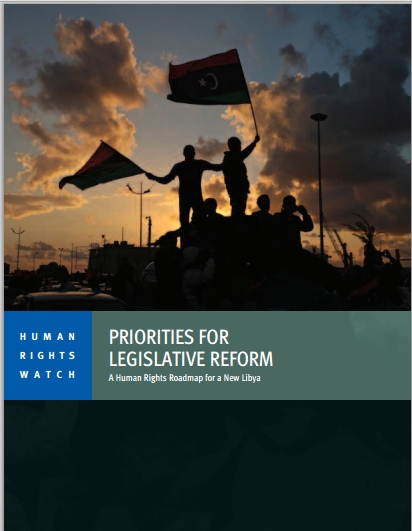Libya: Priorities for Legislative Reform - A Human Rights Road map for a New Libya, HRW - 2014
Libya is failing to institute the rule of law and protect citizens’ rights, as the country slides deeper into lawlessness, Human Rights Watch said today in its World Report 2014. While the government may have limited ability to rein in hundreds of armed militias that are carrying out abuses and operating outside of government control, it can and should make progress on reforming repressive laws that violate human rights and hinder the country’s democratic transition.
In a 69-page companion report published today, Human Rights Watch called on Libya to press forward with such legislative reform, making abolishing the death penalty for more than 30 crimes the top priority. The government should place an immediate moratorium on death sentences until the laws are revised, particularly in light of concerns about the fairness of the judicial process. Lawmakers also should repeal Gaddafi-era laws that prescribe corporal punishment, including lashing for extramarital intercourse and slander, and amputation of limbs.
Among the priorities for legislative reform are:
- Amend laws that impose the death penalty;
- Revise laws that criminalize free expression including blasphemy and defamation laws;
- Pass laws and regulations to ensure the fair and non-discriminatory distribution of licenses for print and broadcast media;
- Pass laws against torture consistent with international standards. Ratify the Optional Protocol to the UN Convention against Torture and set up an independent inspection mechanism for detention centers;
- Revise laws that discriminate against women or effectively sanction violence against them;
- Adopt an asylum law to protect the thousands of migrants and asylum seekers who come to Libya every year and ratify the United Nations Convention Relating to the Status of Refugees.

Comments/Questions?